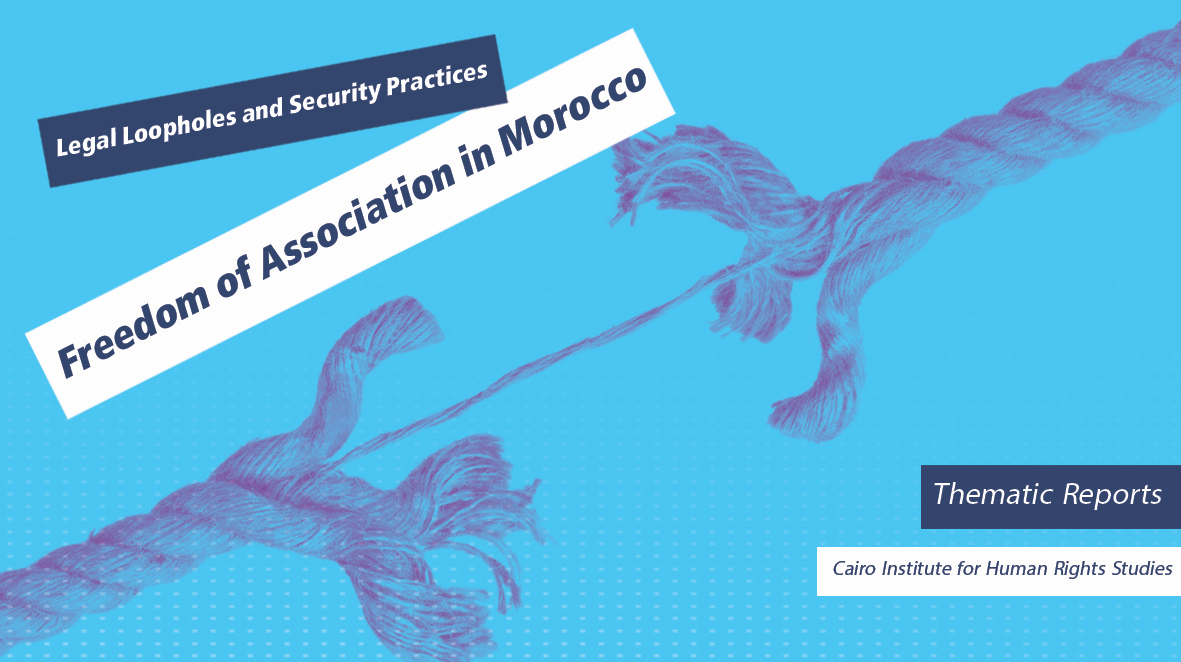Freedom of association in Morocco witnessed relative improvement in 2016–2017. Yet the continued application of outdated laws governing civic activities forebodes a reinstatement of numerous arbitrary administrative and security practices that imperil civil society, as detailed by the report “Freedom of Association in Morocco: Legal Loopholes and Security Practices,” issued by the Cairo Institute for Human Rights Studies (CIHRS) today 3 January, 2018. Without changes to bring these laws in line with the 2011 Constitution and its guarantees regarding freedom of association, the report warns that practices formerly beleaguering local and international rights organizations may reemerge.
The report first analyzes the laws regulating civic associations in Morocco, examining the exploitation of loopholes and lapses in the law to restrict local and international organizations, especially those working on human rights in Morocco. The report then examines the tendency of state security and administrative agencies to prioritize their response to security concerns at the expense of fundamental rights and liberties. This modus operandi, the report warns, has exacerbated terrorist threats in the region.
In some cases, Moroccan state practices impede non-governmental organizations, both national and international, from exercising their right to freely form civic associations, which is incompatible with pledges from the king as well as the Moroccan Constitution. The practices include increasing administrative restrictions to prevent NGOs from completing the legal registration process, which can lead to an unlawful prohibition on organizations’ activities. In addition, the work of international NGOs has been obstructed by prohibitions on their staff and researchers from conducting fieldwork or operating on Moroccan territory, and some have been expelled from the country.
To counteract state practices hostile to civil society that ultimately jeopardize national security and stability, the report offers a set of recommendations to foster a climate amenable to the right of association. This includes the abolition of all legal and administrative restrictions on human rights organizations, together with a reconsideration of the standards permitting authorities to ban an association’s activities based on its objectives. This reconsideration requires the authorities to submit a legally and constitutionally valid cause when ruling to suspend an association’s registration process and deny its legal recognition.
In line with other Moroccan rights initiatives, the report emphasizes the importance of independent regulatory bodies distinguished by transparent practices that respect the law. These regulatory bodies must implement rulings issued by Moroccan administrative courts in favor of associations that have been subjected to an unlawful prohibition of their activities as well as arbitrary administrative obstacles, especially in regards to registration. The report also recommends lifting all restrictions on international human rights NGOs and re-sanctioning their operation.
Morocco ratified the International Covenant on Civil and Political Rights without reservation. Article 22 of that convention states, “Everyone shall have the right to freedom of association with others.” Article 12 of the 2011 Moroccan Constitution reaffirms the right to freely associate: “Civil society associations and non-governmental organizations shall be formed and freely practice their activities within the framework of respect for the constitution and law.” All that remains is for official state policy to reflect Morocco’s ratified commitments and privilege fundamental rights and freedoms over repressive and arbitrary security practices. The supremacy of fundamental freedoms is not only imperative for the functioning of civil society but for the stability, security and prosperity of Morocco.
Full report : Freedom of Association in Morocco PDF
Share this Post

